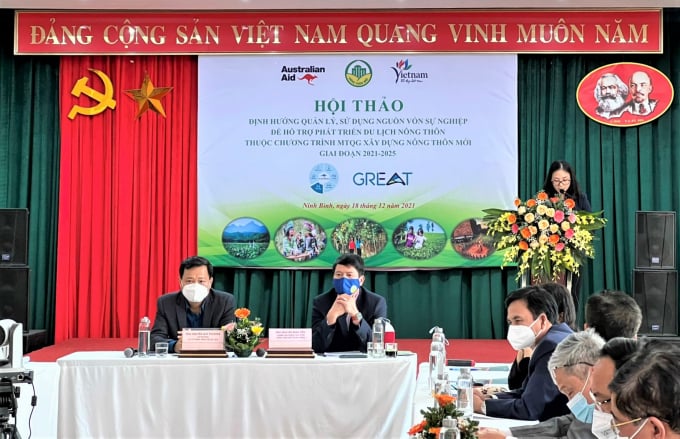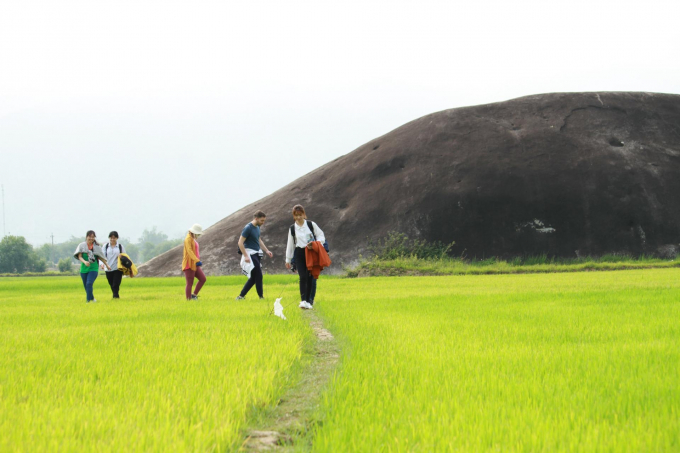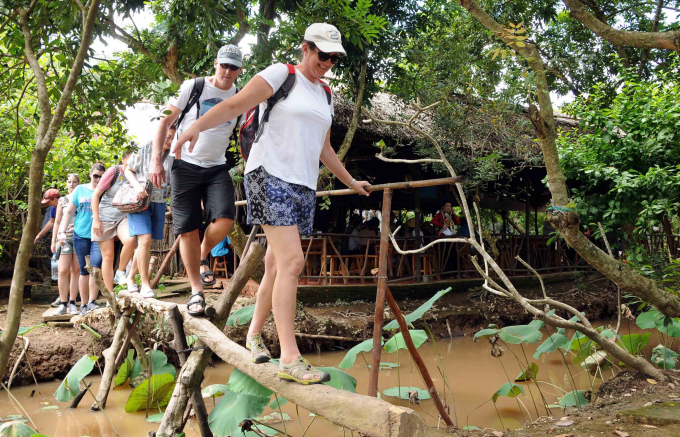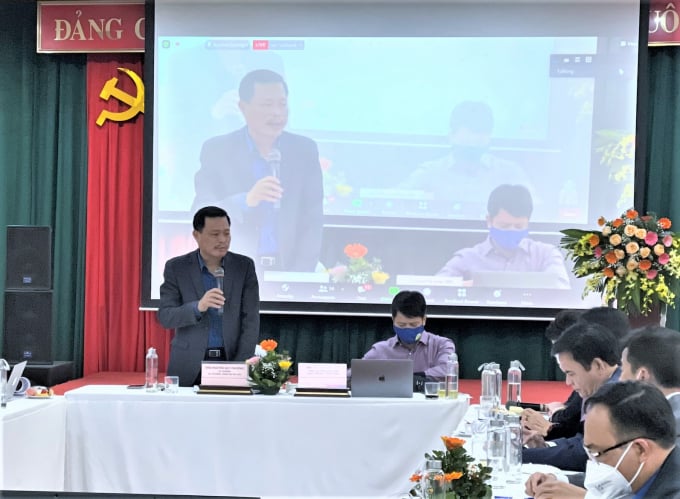June 21, 2025 | 00:58 GMT +7
June 21, 2025 | 00:58 GMT +7
Hotline: 0913.378.918
June 21, 2025 | 00:58 GMT +7
Hotline: 0913.378.918

The Workshop on orientations for management and use of non-business capital to support rural tourism development under “the 2021 - 2025 National Target Program on New Rural Development”.
On December 18th, the MARD Central New Rural (NR) Coordination Office held a workshop on orientations for management and use of non-business capital to support rural tourism development under “the 2021 - 2025 National Target Program on New Rural Development” (NTP - NRD).
According to Mr. Nguyen Minh Tien, Director - Chief of the MARD Central New Rural (NR) Coordination Office, conservation and promotion of traditional cultural values have been strongly promoted within the implementation of NTP - NRD.
As infrastructure, ecological landscape, and cultural values are now restored and better preserved, many localities have actively carried out many rural tourism models in the past three years.
The One Commune One Product (OCOP) National Program has a group of OCOP products namely community-based tourist attractions. Up to now, thirty-six community-based tourist attractions across the country have been recognized as 3 - 4 stars OCOP.
“It can be seen that even without policies or a policy framework, businesses and other subjects seem to have understood the needs of tourists. They take full advantage of the situation and promote the effects of NTP - NRD to develop rural tourism step-by-step," said Mr. Nguyen Minh Tien.

Improving the landscape of rural areas is the foundation to develop rural tourism. Photo: Y Xim.
It can be seen from practice that localities have set their heart on developing rural tourism using models of community-based tourism and eco-tourism. However, the majority of rural tourism destinations develop spontaneously.
The Ministry of Agriculture and Rural Development as well as the Ministry of Culture, Sports and Tourism therefore wish to have an overall policy framework to support and create conditions for rural tourism development within NTP - NRD.
A representative of the Institute of Policy and Strategy for Agriculture and Rural Development (IPSARD - MARD) presented “The 2021 -2025 Draft Program on Rural tourism associated with New Rural Development.”

The development of rural tourism will positively impact all three economic - social - environmental factors. Photo for illustration purposes only.
The overall goal of the program is to develop rural tourism in association with promoting the potential and strengths of agriculture as a whole such as craft villages and cultural-ecological environment in localities. The program aims to improve the physical and mental life of rural people and contribute to restructuring the rural economy towards multi-value integration.
The program will contain four key tasks: promote and raise awareness about rural tourism in new rural development; upgrade and invest in tourist destinations while implementing new rural development criteria; develop rural tourism products with signature regional and zonal characteristics; apply pilot models for rural tourism development.

Mr. Nguyen Quy Phuong (standing) believes that rural tourism will contribute to alleviating farmers' worries regarding the situation of ‘good harvest but bad price’ or 'good price but bad harvest'.
According to Mr. Nguyen Quy Phuong, Director of the Tourism Department (Vietnam National Administration of Tourism - Ministry of Culture, Sports and Tourism), the development and promotion of tourism in the agricultural sector is of great importance. But so far linking tourism to agriculture to create the rural tourism industry still seems far-fetched.
Mr. Nguyen Quy Phuong raised the issue, “community-based tourism’ is not the correct term. As the rural area is the most comprehensive element, ‘rural tourism’ is what it should be called. The word ‘rural’ already includes ‘community’, ‘agriculture’, ‘farmstay’, or even ‘homestay”.
Agriculture is on its strong flow of development, and Vietnam’s agro-products have conquered many strict international markets. But the country’s agricultural production is currently entangled with the worry of ‘good harvest but bad price’ or 'good price but bad harvest'.
Farmers need to develop rural tourism so that they can improve agricultural production at a stable rate, as experts say: “away from the farmland, not the homeland.”
Rural tourism development is not only a fated path but also considered as an opportunity to increase people's incomes and at the same time change the awareness, habit and behavior of locals in the context of new rural development. This is a two-way relationship. Rural tourism development will ensure a more sustainable rural area, improve the quality and depth of the new rural areas.
The ultimate goal of rural tourism development is to improve the lives of farmers both physically and mentally.
(Mr. Nguyen Minh Tien, Director - Chief of the MARD Central New Rural Coordination Office)
Translated by Samuel Pham
![Turning wind and rain into action: [9] Digitizing hydrometeorological data in response to climate change](https://t.ex-cdn.com/nongnghiepmoitruong.vn/608w/files/news/2025/06/17/z6704423696987_15fd32ffc26d590d204d520c9dac6786-nongnghiep-165943.jpg)
(VAN) Farmers have begun accessing hydrometeorological applications to adjust their cropping schedules, aiming to ensure productivity and adapt to climate change.
![Turning wind and rain into action: [8] Real-time salinity detection and early warning technology](https://t.ex-cdn.com/nongnghiepmoitruong.vn/608w/files/news/2025/06/17/z6704423696987_15fd32ffc26d590d204d520c9dac6786-nongnghiep-151127.jpg)
(VAN) Thanks to the integration of modern hydrological-hydraulic models, remote sensing technologies, and artificial intelligence, the accuracy of hydrological forecasting has significantly improved.
![Turning wind and rain into action: [7] Early disaster warnings help marine farmers minimize losses](https://t.ex-cdn.com/nongnghiepmoitruong.vn/608w/files/news/2025/06/17/z6704423696987_15fd32ffc26d590d204d520c9dac6786-nongnghiep-142942.jpg)
(VAN) In recent years, thanks to early disaster warnings and forecasting, marine farmers in Khanh Hoa province have been able to reduce risks and losses, thereby improving production efficiency.
![Turning wind and rain into action: [6] ‘Four on-the-spot’ disaster management software](https://t.ex-cdn.com/nongnghiepmoitruong.vn/608w/files/news/2025/06/17/e5a48259d6a262fc3bb3-nongnghiep-183800.jpg)
(VAN) By simply activating the scenario on the disaster management software, the relevant authorities immediately know how many households need to be evacuated, where to evacuate them to, and by what means of transportation…
![Turning wind and rain into action: [5] Hue applies modern technology in disaster forecasting](https://t.ex-cdn.com/nongnghiepmoitruong.vn/608w/files/news/2025/06/17/z6704423696987_15fd32ffc26d590d204d520c9dac6786-nongnghiep-093938.jpg)
(VAN) In Hue city, modern technology has recently been applied in meteorological and hydrological forecasting and warning, helping to reduce the damage caused by natural disasters.

(VAN) A cutting-edge farming technique being implemented on an experimental ranch in Arizona's Sonoran Desert has already saved a billion gallons of water over five years, according to Civil Eats.

(VAN) Poultry and pig production and the environment can be boosted through enhanced water technology, according to new research.